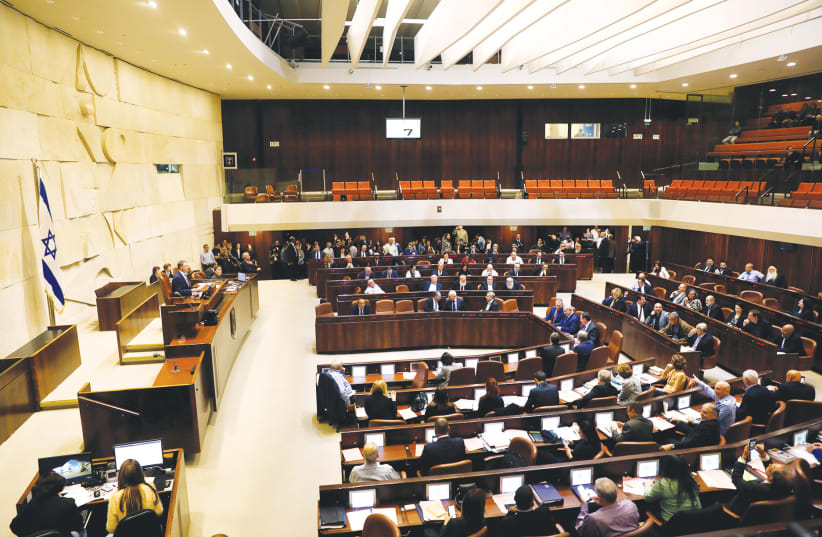I read, and reread, the recent JTA article published in The Jerusalem Post, “Israeli MKs propose giving Diaspora Jews a formal role in Israeli affairs” with a sense of curiosity and confusion. I have not read the proposed legislation referenced, and this is my only source. My intention is not to be contentious, and certainly not offensive, but the idea seems half baked at best and deserves a serious discussion, one that I am not really sure is taking place in the Knesset, and if it is, whether it’s able to be free of political considerations.
I wholeheartedly and unequivocally agree that Israeli leaders of all stripes, not just in the Knesset, should engage, consult and learn from Jews in the Diaspora. We should do that to create understanding and build unity, even on issues about which we disagree. Israel matters to the Diaspora and the Diaspora matters to Israel, 100%.
However, from reading this article about a bill that’s being proposed in the Knesset, it came across as yet another silly and unnecessary form of legislation that has no substance or teeth. It may be well-intentioned, but it does not seem well-grounded. If it can’t be defined or enforced, why should it become a law?
Proposing, much less passing, something like this may feel good on the surface, especially to Diaspora Jews, but is just another way to let down our brothers and sisters overseas. This would stand to become yet another scenario where the government passes laws, and then doesn’t follow up. There is no shortage of these. It makes the government look silly, lose credibility, and regardless of the issue, give us all the feeling that it’s just not reliable. What’s worse, proposing such a law that never passes, or passing it and having no substantial difference?
Eric Fingerhut, head of JFNA is quoted, saying that he would imagine that Israeli leaders would or should want to know what (American) Jews overseas are thinking. I would imagine that if there were something critical on the agenda of the heads of JFNA, AJC, AIPAC, Hadassah, the different religious streams, and others, they know how to and can access Israeli leaders from the prime minister on down. Why does this need to be legislated? Why not just set up a conference call once a month or quarter to touch base, and recalibrate?
These same leaders are sophisticated and connected enough to know that Israel has a tendency to legislate in the Knesset, or approve in the cabinet, things that are not followed through. Why set this up as yet another, with even more to lose?
The MK who is proposing this bill understands that it’s vague. That means that even if such a bill were to pass, it would open up to 120 MKs the potential for 240 or more interpretations as to what the issues are which are relevant to Diaspora Jews that require consulting, and what such consulting would look like.
To be sure, most veteran Knesset members, even many of the Arab ones, already have relationships and consult Diaspora Jews. They may only consult people who are religiously or ideologically compatible with their own views, so nothing new is gained. What will change? Does the “consulting” which is already being done count, or does it have to be new consulting? Who defines it?
What does “consulting” Diaspora Jews mean anyway? Who is required to be consulted? Will Diaspora Jewish organizations and Jewish leaders compete for the right to be consulted? Who decides? What does it all mean? Will Arye Deri now have to meet with Richard Jacobs and the Reform movement? Will Ahmed Tibi have to consult with Mort Klein and the ZOA?
Is it expected that “consulting” will be required with the heads of organizations that raise a certain amount of money? How much? What other measures of who is consulted will there be? Is it about money at all, or only about money?
Let’s not even open the can of worms as to “who is a Jew” and who needs to be consulted, heaven (or God) forbid, depending upon your religious orientation.
There is a surprisingly great lack of understanding between Israeli Jews and Diaspora communities. That’s understood. There needs to be dialogue and good will. Interests need to be tempered or at least based on reality. That doesn’t mean reality can’t and shouldn’t change, but a new law to legislate that, doesn’t seem like a good idea, or even an idea worth taking time on.
But if we are going to legislate silly things, I would like to propose a bill that coffee ice cream be the official flavor of Israel. On that we can all agree.
I will reserve judgment, however, until I read the bill.
The writer is president of the Genesis 123 Foundation, which builds bridges between Jews and Christians and Christians with Israel. He made aliyah in 2004.
